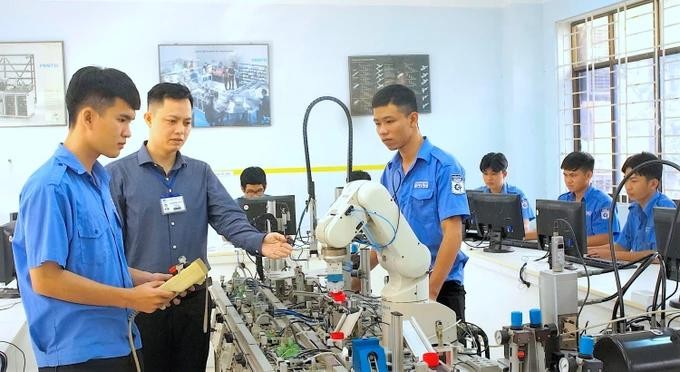
With the vocational education system now under the state management of the Ministry of Education and Training, a transition from the Ministry of Labor, Invalids and Social Affairs, parents, students, and vocational institutions are focused on future training methodologies, pathways to higher education, and effective linkages to job creation as the enrollment period nears.
Leaders of vocational education institutions have identified the most pressing enrollment concern for 2025 as the confluence of two significant educational reforms: this year marks the initial implementation of the high school graduation examination under the 2018 General Education Program, and universities are simultaneously introducing changes to their enrollment regulations and score conversion methods.
Vice Principal Truong Van Tam of College of Electro-mechanics and Construction in Bac Ninh Province noted that the enrollment season is becoming increasingly active. However, the institution is still awaiting guidance from the Ministry of Education and Training to finalize the procedures for linking its data system with the ministry's centralized enrollment system. As a result, the enrollment advisory process continues to rely on traditional methods, which poses challenges for both the college and prospective students.
Principal Nguyen Khanh Cuong of Lilama 2 International Technology College in Dong Nai Province shares concerns about the delayed integration of university and college databases with the Ministry of Education and Training’s enrollment system. To stay proactive, the college has already prepared its full enrollment information and is ready to upload it as soon as the ministry provides official guidance.
Addressing the challenges in joint training initiatives, Principal of Ly Thai To College in Bac Ninh Province Associate Professor Nguyen Tien Dong noted that in October 2024, while vocational education still fell under the purview of the Ministry of Labor, Invalids and Social Affairs, the Ministry of Education and Training had already circulated a draft decree regulating joint training across different levels within the national education system for public comment.
According to the draft, graduates of intermediate and college programs may pursue university transfer training, regardless of whether they hold a high school diploma. Higher education institutions will determine the recognition of prior learning based on training regulations, specifically for intermediate graduates in the same occupational group. However, exemptions or reductions in coursework within the university program must not exceed 20 percent of the total curriculum.
























